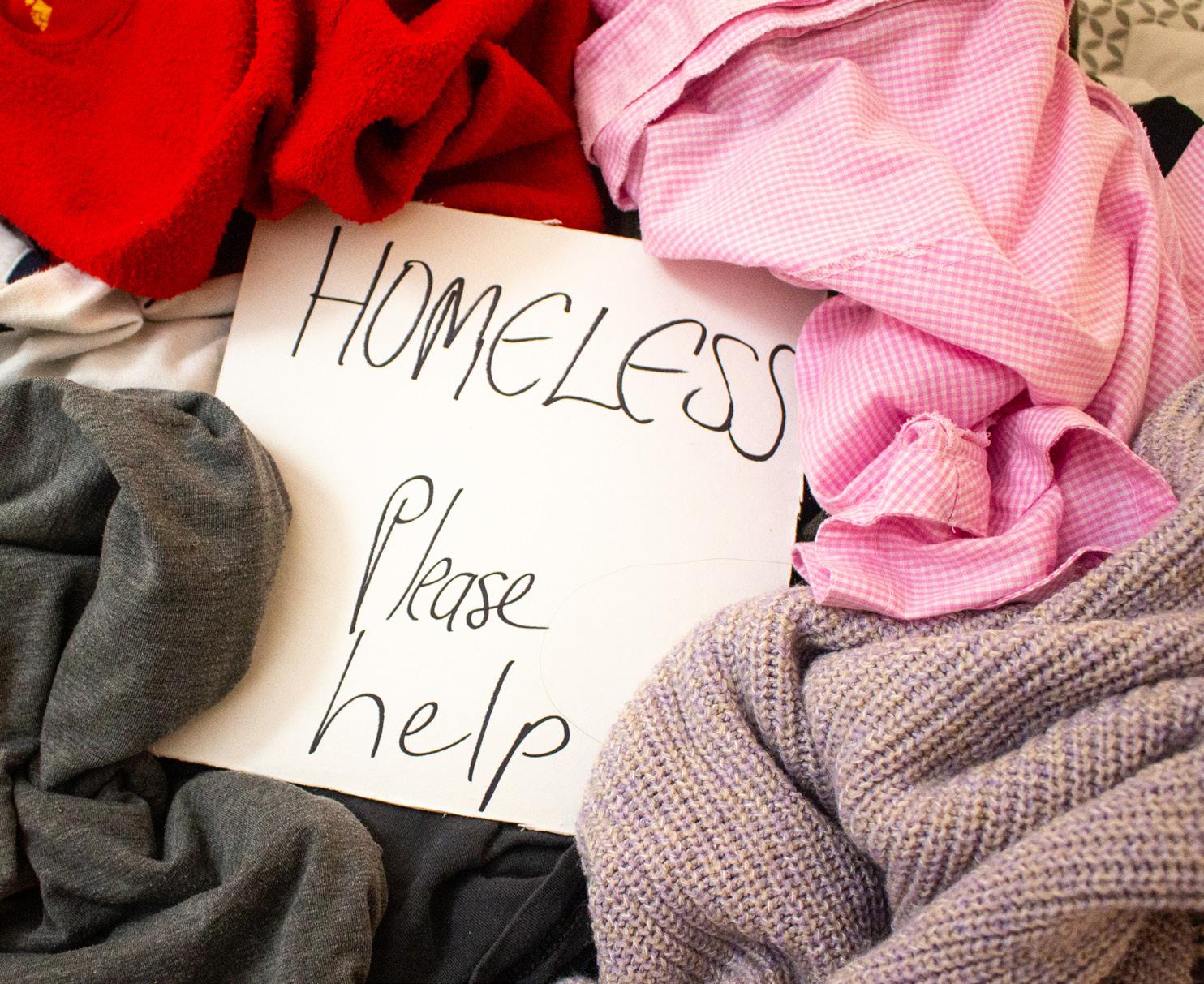
4 minute read
Homelessness in Toronto ●
from Pro Tem - Vol. 60 Issue 2
by Pro Tem
Slowly Slipping Through The Cracks: Homelessness in Toronto
Rejean Ghanem French Journalist
Advertisement
TW: Mental Health Issues, Homelessness The other night, as I was nestled in my bed watching The Crown, I heard the sound of metal clanging outside. I wondered what could possibly be making such a noise in my usually quiet neighbourhood. I took a peek out of my window and saw a young man rummaging through the garbage, looking for scraps. It is becoming harder and harder to ignore the homelessness crisis in Toronto. You could start by walking through the streets of downtown Toronto. Plenty of homeless people are sleeping on the streets, begging for money, or just riding the TTC since they have nowhere else to go. The reality is, Toronto is too expensive; a bachelor pad in a safe area that is clean and modernized is usually about $1,800 a month at least. And even for $1,800 a month, there is no guarantee of a wall separating your bedroom from your kitchen. The cost of living has gone up so much that the majority of generation Z and younger millennials worry if they will ever be able to afford a house. How will they provide for their future children? While there is so much to discuss about the homelessness crisis, this article will focus on why people become homeless in the first place. A common misconception is that a homeless person is on drugs, or rebelled against their family and couldn’t support themselves. While this could be the case, there are other causes as well. Social factors, such as housing prices, play a large role, but there is another factor that often goes ignored: mental health. The relationship between mental health and homelessness is a complex topic. Research shows that it is a two-way street. The mental health of a person could become so erratic and destructive that they are unable to keep a job or function in society. If this person lacks support and does not have many friends or family, they can easily slip through the cracks and begin to wonder where they will sleep that night. While a common issue, one might wonder what kind of mental health issues could someone possibly have where it gets this bad.
The answer is any type of mental health issue. While many people function with depression and anxiety, there are certain mental health issues seen as “too difficult” in society. These generally fall amongst personality disorders, including borderline personality disorder, or the outlier, schizophrenia. While qualified doctors and psychologists who can treat these people exist, getting help serves as a huge hurdle, with therapy costs starting at $180 per session. This, of course, does not include the cost of medication. At this point, you may be thinking, “Well, these issues begin in childhood. Why not just treat them from the beginning?” Unfortunately, it is not as black and white as you might think. Schizophrenia, for example, does not begin in childhood. It often begins, on average, at age 21 in men and at age 25 in women. While you might begin to think someone could look into their family history for schizophrenia, it is important to remember a lot of times people do not get diagnosed. Why? Usually because the patient believes nothing is wrong with them or because they lack the support at home to seek treatment. You see now just how easy it is to slip through the cracks. At 17, when I was in high school, everyone looked to my classmate to become the next Bill Gates. He was academically intelligent. He was a math and science whiz. He even got into a very prestigious program at a university where Microsoft sought him out. Everyone was awed by him and had such high hopes. At age 21, he began to believe that he was Michael Jackson reincarnated. His dangerous and self-destructive behaviour eventually bled into his academic and professional life. Not too long after, he was kicked out of his program, losing his Microsoft deal and his apartment in the process. His family had no desire to help him. He was diagnosed with Bipolar Disorder and Schizophrenia and was homeless for a time. Luckily, he did receive some help. Yet, just walking by him, many would dismiss him as crazy. Little do they know that for a time, he was a certified genius.
While the story I recounted is quite sad, it highlights the harsh reality in our country: mental health, especially mental illnesses deemed as “ too difficult,” is ignored and shunned. This results in homelessness, a situation that could happen to anyone. We live in a country that ignores this reality. To fix the homelessness crisis, we must change the narrative of what homelessness is. It’s not just some guy at Queen and Spadina overdosing on heroin that can’t find a job. It’s a man with schizophrenia who lacked the support and love in his home to get help. It’s a domestic abuse case where a woman fled her home to protect her children. It’s a young girl with an undiagnosed borderline personality disorder that was deemed “too difficult” by her colleagues and never got the help she needed. We cannot ignore this problem further - all of these people deserve our help.









